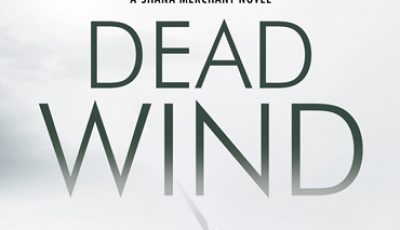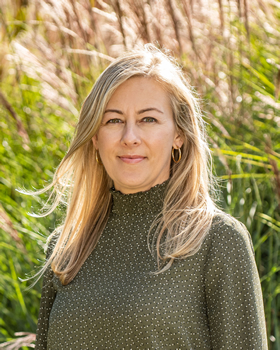

Excerpt: Dead Wind by Tessa Wegert
PROLOGUE
Alexandria Bay, New York
 Trey Hayes arrived wearing a hoodie and sweatpants, white stripes down the sides of his thin legs. When he met my gaze, there was no mistaking the timidness in his eyes. They still shone, but weakly. He was a flashlight stuffed with dying batteries. A few blinks away from going out.
Trey Hayes arrived wearing a hoodie and sweatpants, white stripes down the sides of his thin legs. When he met my gaze, there was no mistaking the timidness in his eyes. They still shone, but weakly. He was a flashlight stuffed with dying batteries. A few blinks away from going out.
A message from his parents was the last thing Tim and I had been expecting. We’d interviewed the boy already, when he was recovered from the cold, dark place where his abductor had abandoned him. We’d taken his statement and let him get on with the process of healing, knowing it wouldn’t be easy. This was the same kid, after all, who was forced to look on while a whetted knife was raised above his face. Who was missing pieces of himself he’d never get back. It could take years for Trey to come to terms with what happened to him – and if he were my child, there was no way he’d set foot in the New York State Police Troop D Alexandria Bay station ever again. But there was the message, right on Tim’s phone. Texted to the number on the card my fellow investigator had handed Trey’s parents that snowy day just a few weeks ago.
A request to meet.
I’d thought about the strangeness of this turn of events before leaving for work that morning. I had been monitoring the St Lawrence River closely in recent days, waiting for the ice to form. My first winter in the Thousand Islands, and I was as excited as a kid at the drive-in. I saw the first patches of ice float by as I descended the steps from my front door. They were glacier-blue in the feeble winter sunlight, so thin in places that they looked like lace, and as the river moved the ice along, broken shards collected along the shore. The pieces chimed when they collided, the sound like freezing rain tinkling against a windshield. The shoreline looked as though it was cluttered with shattered glass.
‘It’s you they want, Shana,’ Tim had said when he got the text. ‘They want you to talk to Trey.’
Flanked by his parents, the boy sat down at the table in the interview room while Tim made him a hot chocolate: sweet powder, kettle water, tiny dehydrated marshmallows bobbing on the surface. Trey took it gratefully, ran a finger around the lip of the paper cup, and licked the foam from his nail.
‘Thanks for coming,’ I said, not just to Trey but also his parents. His mother’s mouth was a tightly stitched seam, the skin around her eyes purple.
‘This wasn’t our idea,’ Virginia Hayes announced, fixing me with an unflinching gaze, ‘and I’ll be honest, I have my doubts about this.’ The roots of her sandy blonde hair were growing out, and her lips were dry and peeling. Self-care had been pushed to the backburner the moment she found out her son went on a school field trip with his teachers, parent chap- erones, and thirty-nine other fourth grade students, and didn’t come back. ‘We’re here at the recommendation of Trey’s therapist.’ The woman’s tone was grim.
Richard Hayes hooked an arm around Trey’s rawboned back and splayed a hand on his wife’s shoulder. ‘Trey’s supposed to talk about it,’ he explained. ‘It’s supposed to help him cope.’
My eyes met Tim’s where he stood by the door, and I watched his eyebrows twitch. I was starting to piece things together. Still, offloading the victim of violent crime to a couple of detectives under the pretense of augmenting his therapy seemed akin to a surgeon asking a hospital maintenance worker to take his place in the OR. Then again, I’d seen mental health counselors do some irregular things.
‘Dr Tesh said it would be good for Trey to find someone he could relate to. She thought…’ Richard’s gaze hitched itself to the scar that had been carved into the side of my own face. The eternal wound that looked just like his son’s. He didn’t finish his sentence. There was no need.
‘OK.’ The word came out gruffer than I intended. ‘If it’s all right with you,’ I said to Trey, ‘I’d like to ask a few questions. About the man who took you.’
Trey’s head snapped up. He had both hands wrapped around the steaming paper cup, and they started to tremble. His mother leaned toward him and gave me a look that could have cut glass, but it was too late. Trey’s shaky hands upended the cup, sending a pool of scalding brown liquid across the tabletop. Chair legs screeched as Trey’s parents jumped to their feet, pulling their son up with them. Tim was gone and back with a roll of paper towels before the first drop of cocoa hit the floor.
‘I’m sorry,’ Trey’s father muttered while Virginia held the boy’s face in her hands and told him it was all right, not his fault, no big deal. Working together, Tim and I mopped up the mess as quickly as we could. Three weeks. That wasn’t enough time for a twisted ankle to heal, let alone for a child to bounce back from a trip to hell. I’m going to lose them, I thought as I dragged a sopping wad of paper towel across the table. I can’t lose them.
I lobbed the saturated lump into the trash. Come on, Shana. Think.
‘Hey Trey.’ I gestured for the family to take their seats once more while Tim called down the hall for a replacement cocoa. ‘Have you ever played Never Have I Ever?’
The game had been a favorite of mine as a kid, from grade school all the way until junior high. I wasn’t sure if it was still in fashion, if Trey would even have a clue what I was talking about, but he did something with his head that I took as affirmation, so I folded my hands on the sticky table and leaned toward him with a smile.
‘So, it’s a really fun game, and it goes like this: I say ‘never have I ever’ about something I haven’t done, and you tell me if you have done it. If you’ve done it, then you win. It’s easy. Should we try?’
A nod.
‘Here we go,’ I said. ‘Never have I ever eaten worms.’ Trey’s eyes widened, and a smile tugged at his lips. He
looked up at his mother, whose expression was already softening. ‘Do gummy worms count?’ Trey asked, his voice barely audible even in the quiet room.
‘Yes!’ I beamed at him, making sure he knew how pleased I was that he was playing along. ‘That means you win the round. And then you get to ask the question. Sound good?’
Trey nodded again. He was in.
‘OK.’ I took a breath and tried to keep my eyes on the kid. Behind him, Tim reached for his notebook. ‘The first question I want to ask isn’t actually about you. It’s about that man.’
Trey stiffened, and his dark eyes grew wary. But he didn’t shrink away from me.
‘When you answer,’ I told him, ‘say what he would say if he was playing. Get it?’
Virginia shifted in her seat. This wasn’t why she brought her son here, not part of the plan, and her trepidation was plain to see. Where Trey’s recovery was concerned, the questions I was about to ask would do no good. If anything, they might cause Trey to regress, and that prospect made my stomach clench and a wave of acid swell in my throat. If I was going to succeed at finding his captor, though, and eliminate the possibility of more victims, more damaged psyches, more death, I had to get Trey to talk on my terms. I tried to convey this to his mother without words, a silent exchange that played out over Trey’s head. Her lips were pinched tight when she pulled the nine-year-old onto her lap as if he were a toddler, but she didn’t argue. She knew as well as I did the black presence that loomed over her child would never be fully vanquished until the man who’d taken Trey was found.
Here’s what I know about Blake Bram: he likes to talk. When he was my captor, almost eighteen months before he came for Trey, the man wouldn’t shut up. That had worked in my favor. I learned things about him that helped me. I could only hope Trey had, too.
We were already in possession of an excellent composite sketch, so I didn’t need Trey to tell me what the fugitive we were hunting looked like. I’d seen him for myself, and felt sure now that if ever he got close enough for me to get a good look, he wouldn’t escape again. What I was digging for with Trey was something else. Social characteristics, marketable skills, previous occupations – anything that might provide us with a clue to where Bram was hiding. Bram was at large, possibly still in the area, and his most recent victim sat right in front of me. I had to take my shot.
‘Never have I ever been to New York City.’
Trey blinked. Looked up at his mom and then his dad, both of whom gave him a nod of encouragement. ‘Yes,’ Trey said, turning his face back to me. ‘He was there. He worked in New York. He used to clean an apartment building. Like the custodians at my school.’
‘Great. Great job, Trey.’ It was what I’d been hoping to hear. If Bram had told Trey about New York, he might have told him much more. This is working. I kept my face neutral, once again resisting the urge to look at Tim. ‘You know, I’ve been to New York,’ I said. ‘I used to live there.’ It felt like a lifetime ago. ‘Does the man work as a custodian here, too?’ I held my breath, and waited.
Trey shook his head. ‘He doesn’t do that anymore. He didn’t like it.’
There was a gentle knock at the door. Don Bogle, bless his heart, appeared with a fresh hot chocolate for Trey. Tim took it from him with both hands and carefully set it down in front of the boy.
He doesn’t do that anymore. The revelation was huge, so critical I had to fight to contain my glee. When I thought about Bram, and what he might be doing now, I always imagined him smelling of floor polish and jangling with keys the way he had back in the city. I’d been calling all the apartment complexes, gyms, and nursing homes in a thirty-mile radius from where I currently sat, hoping they’d recently hired a loner with Bram’s skin tone and build. I’d struck out at every turn. And now I knew why.
I had some experience with criminal profiling, and I was sure that while he plotted his next crime, Bram was operating as a functioning member of society. He didn’t come from money, and would need a way to make ends meet. So Bram was working – which meant that if I hoped to find him, I needed to know his occupation. Bram had to have some kind of know-how that would be useful here. In Upstate New York.
‘I know it’s your turn now,’ I said as Trey slid off his mother’s lap into his own chair once more, ‘but is it OK if I ask another one? Give you a chance to drink that before the marshmallows melt?’
I didn’t wait for him to answer. Trey’s face and limbs had loosened. For the moment he was happy, and I wanted to capitalize on that. I said, ‘Never have I ever worked on a boat.’
It was a long shot. We had no hard evidence that Bram had been a deck- or dockhand. But he knew how to drive a motor- boat. He’d stolen a skiff to transport Trey, and that wasn’t a skill the man had possessed in his youth. I didn’t know how long Bram had been living in New York before he started killing women, before he took me; it was possible he’d had a job at the docks, maybe done some commercial fishing on Long Island. It stood to reason that, one way or another, he’d been on the water. That he’d amassed enough experience to find steady work.
But once again, Trey shook his head.
‘No time with boats at all?’ I asked, deflated.
Trey took a sip from his cup and licked the bubbly foam from his rosebud lips. ‘No,’ he said. ‘He worked with boats. Just not on a boat. Do I still win?’
The current of excitement started in my toes and zipped straight up through my body. ‘The man told you he worked with boats?’
‘We have a boat. In the summer I go tubing. So I know about marinas.’
Across the room, Tim’s pen scratched wildly on the pad.
‘That sounds like fun,’ I said. ‘So the man worked at a marina? Did he say where it was?’ If I could track down a previous employer, I might be able to learn more about the work Blake Bram had done. The false identity he’d been using. Where he was working now.
Trey avoided my gaze and pinched his lower lip between his teeth. It was a no.
‘Did he mention where he was living? If he had a house or an apartment somewhere?’ I bit back the words around here. The last thing the kid needed was a reminder that Bram could still be nearby.
‘No. But he went someplace else during the day.’
This we already knew from our brief preliminary interview with Trey and his parents. For much of the time Trey was held captive, he was alone. Just as I had been.
‘And he didn’t tell you where?’ I confirmed.
A shadow passed across the boy’s face. ‘He said he had to be careful not to say too much. He said that would take the fun out of it.’
Take the fun out of it.
You son of a bitch, I thought, picturing Bram’s face as I’d last seen it and digging my fingernails into my palms. Those words were a message, meant expressly for me. A reference to our shared past and the twisted games he’d baited me into playing when we were kids, back in small-town Vermont. They were an allusion to my efforts to hunt him down, and his to evade me. The relentless chase we’d been engaged in for months.
‘Did he say anything else?’ I asked. ‘Anything at all?’
Trey shrugged his shoulders. ‘He mostly just talked about boats. Boats, and girls.’
‘Girls?’ I said too quickly.
‘His girlfriends.’
‘Do you remember their names?’
‘Some of them. Jessica. Robyn.’
I felt my brow quirk. Jessica, we knew. Jess Lowenthal had been Bram’s third victim, killed in my precinct. Her body dumped at a construction site across from Tompkins Square Park. But Robyn? In all, Bram had taken three women, all of whom he’d met through an online dating site. None had been named Robyn.
Since the moment I realized who my abductor was, I’d been desperate to understand him – not just his predisposition to serial murder, whether biological, social, or psychological, but also his movements. What had he been doing all these years? Where was he hiding? In New York, his killings were well- documented. Investigators continued to search for him in the hope that they might bring closure to his crimes and give the victims’ families some peace. But Blake Bram was a canny man. In addition to those victims, he’d taken me. I had been his fourth target, the only one to survive, and my selection had not been random. I believed he’d planned for a long time to reel me back into his life. Following my escape, he had tracked me to Upstate New York and pulled me into a twisted game of cat-and-mouse.
There were things I thought I already grasped about him, having known him as long as I had, but a single, powerful fear continued to dog me. I was worried the three women he killed in New York weren’t the first. That the real number of his victims remained unknown.
And if that was true, if there were other girls who’d died by my wicked cousin’s hand, I had to find them.
CLICK HERE TO READ MORE!
*****
Tessa Wegert is the author of the Shana Merchant series of mysteries, which includes Death in the Family, The Dead Season, and Dead Wind. A former freelance journalist, Tessa’s work has appeared in Forbes, The Huffington Post, Adweek, and The Economist. Tessa grew up in Quebec and now lives with her husband and children in Coastal Connecticut.
- Africa Scene: Iris Mwanza by Michael Sears - December 16, 2024
- Late Checkout by Alan Orloff (VIDEO) - December 11, 2024
- Jack Stewart with Millie Naylor Hast (VIDEO) - December 11, 2024

